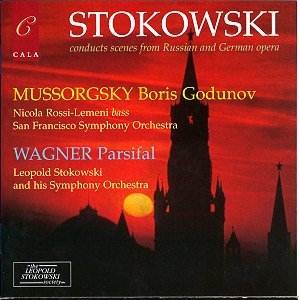Stokowski was in San Francisco in December 1952
for concerts and recording sessions. One was for the Rimsky-Korsakov
orchestration of Boris Godunov, of which selected scenes were
taped and which is now restored to the catalogue in Cala’s latest
Stokowski release. He was certainly not unfamiliar with Boris,
as he’d given the American premiere of a then (1929) newly edited
version, although he never conducted it in the opera house. In
San Francisco he selected the highlights for the disc and, true
to form, included some ostensibly unlikely choices, such as the
Monks’ Chorus from the Pimen Scene. The recording was made two
days after the last concert performance and all concerned are
powerfully engaged in maximal histrionic projection, insofar as
Rimsky’s often delicious scoring allows. The Chorus is bold and
strong – and large – and the orchestra is on fine form throughout,
responding to Stokowski with conviction. And this is entirely
predictable because, though not an operatic conductor, he was
a frequently thrilling conductor of operatic material. One has
to say material as his forays were mainly confined to the concert
hall and often, as here, chunks or syntheses.
The most controversial aspect of this performance
is the casting of Nicola Rossi-Lemeni, who in addition to Boris
also tackles Varlaam. The notes cite contemporary critical opinion
claiming him to have been the greatest Boris since Chaliapin,
which is true only insofar as I am the greatest music critic since
George Bernard Shaw. Whilst the voice is not especially attractive
it does possess considerable power of histrionic projection. He
was doubtless an actor of great presence and maybe the sheer visceral
theatricality he exuded in the opera house and on the concert
platform is dramatically less well served by a recorded remembrance
of it. But I do find quite a bit of his performance to be rooted
in a kind of pantomimic hysteria and the Death Scene in particular
is drenched in a gruesome amount of theatrical "stuff."
Coupled with it come two extracts from Parsifal
– the first the Good Friday music and then an Act Three synthesis
compiled, constructed, call it what you will, by the conductor.
I have great admiration for his Wagner and think it a loss that
we lack a Tristan, a Meistersinger or, more to the point, a Parsifal
from him. He shows a spiritual affinity and a burnished understanding
that are frequently magnetic, whatever one’s view of the idea
of the Synthesis, which he had first played in 1934.
Produced in association with the Stokowski Society
and with notes by Edward Johnson the repertoire might purport
to show us Stokowski the opera conductor manqué. I prefer
to think of his eminently practical syntheses as part of his proselytising
zeal to bring great music to the people and to distil the essence
of a work without injuring its meaning.
Jonathan Woolf
